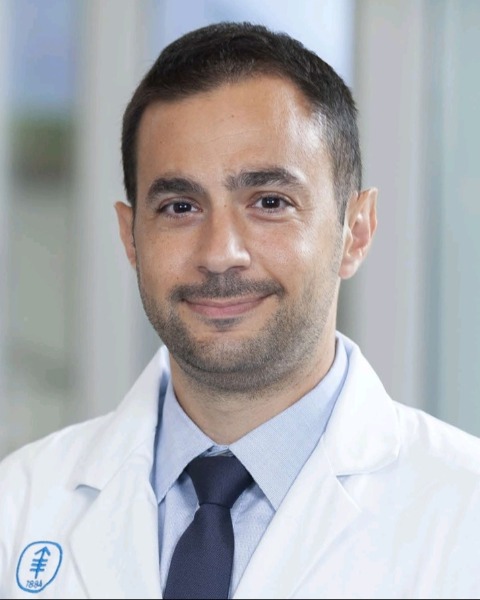Interventional Oncology
Genetic alterations in intrahepatic cholangiocarcinoma and response to yttrium-90 transarterial radioembolization: a case series exploring high risk genomics
- KZ
Ken Zhao, MD
Assistant Attending
Memorial Sloan Kettering Cancer CenterDisclosure(s): No financial relationships to disclose
- EZ
Etay Ziv, MD PhD
Associate Attending
Memorial Sloan Kettering Cancer Center - EA
Erica S. Alexander, MD (she/her/hers)
Assistant Attending
Memorial Sloan Kettering Cancer Center 
Vlasios S. Sotirchos, MD
Assistant Attending
Memorial Sloan Kettering Cancer Center- AM
Amgad M. Moussa, MD
Attending
Memorial Sloan Kettering Cancer Center .jpg)
Brett Marinelli, MD
Assistant Attending
Memorial Sloan Kettering Cancer Center- JE
Joseph P. Erinjeri, MD PhD
Attending
Memorial Sloan Kettering Cancer Center .jpg)
Constantinos T. Sofocleous, MD PhD
Professor IR
Weill Cornell Medical College Memorial Sloan-Kettering Cancer Center- JH
James J. Harding, MD
Assistant Attending
Memorial Sloan Kettering Cancer Center - CS
Carlie S. Sigel, MD
Associate Attending
Memorial Sloan Kettering Cancer Center - HY
Hooman Yarmohammadi, MD
Associate Attending
Memorial Sloan-Kettering Cancer Center
Poster Presenter(s)
Author/Co-author(s)
Genetic alterations in TP53, KRAS, and CDKN2A have been shown to be independent prognosticators of worse survival in patients with intrahepatic cholangiocarcinoma (ICC) {1}. The purpose of this study is to investigate if these genetic alterations predict worse outcomes for ICC patients treated with yttrium-90 transarterial radioembolization (TARE).
Materials and Methods:
ICC patients with next-generation sequencing (NGS) of tumoral tissue treated with TARE from 2013 to 2021 were evaluated. The medical record was reviewed for prior treatments, including resection, systemic therapy, and liver directed therapies (arterial infusion pump, locoregional therapy other than TARE). Imaging was reviewed for the greatest diameter of the largest tumor, number of segments involved by tumor, presence of extrahepatic disease, and number of hepatic segments treated. Based on presence of a high-risk genetic alteration (TP53, KRAS, or CDKN2A), patients were divided into two groups: Group A = alteration present and Group B = no alteration. The primary endpoint was overall survival (OS) after TARE. Differences in patient characteristics were assessed by the student’s t-test for continuous variables or the fisher’s exact test for categorical variables. Survival analysis was performed using the Kaplan-Meier method, and the statistical significance between groups was assessed using the log-rank test.
Results:
Thirteen ICC patients who received TARE were identified, with median OS 8.84 months. Seven patients (median age 62.4 years, 3 male, 4 female) had NGS and were included in the cohort. Three (42.9%) had high-risk genetic alterations (2 TP53, 1 CDKN2A; group A) and 4 did not (group B). Three (42.9%) patients had hepatic resection, 5 (71.4%) had systemic therapy (median 2 lines), and 2 (28.6%) had liver directed therapy prior to TARE. The cohort's median OS was 10.02 months. Group A had shorter median OS vs Group B (median OS 8.54 vs 25.68 months, p=0.093). Patients in group A had significantly larger tumor diameter (median largest tumor diameter = 8.2 vs 2.5 cm; p=0.046). Other differences in baseline or treatment characteristics were not statistically significant. One (1/3) patient in group A developed hepatic toxicity related to TARE (increased ascites requiring paracentesis and persistent bilirubin elevation). None of the patients in Group B developed hepatic toxicity.
Conclusion:
The presence of high-risk genetic alterations is associated with larger tumors and may predict worse outcome after TARE for ICC. Further investigation with larger size sample is recommended to validate these results.

.png)
.jpg)
.jpg)
.jpg)
.png)
.png)
.png)
.png)
.png)